I'm trying my best and that is the only thing that matters
Don't wanna be here? Send us removal request.
Text
How to GET SHIT DONE
Because it comes up a lot for all of us trying to manage schedules that slam more than 24 hours of work into a day, I thought I would make one giant productivity post for everyone to help us all out (including myself).
10 steps to GET MORE SHIT DONE in a day
JUST START–I think most of us find that sometimes the hardest part to starting a task is overcoming the “ugh–fuck this shit, I don’t want to do this” feeling. So, trick yourself into it. Instead of saying you’re going to work for 8 hours, tell yourself you’ll do an hour… and watch that hour turn into 2 or 3 or 4 magically.
Action fights anxiety–If you’re terrified of a project hanging over your head, just start it!! Instead of waiting till tomorrow or next week when things might be right, just start right now! Do something to help yourself feel better about it. You’ll feel better getting through the rest of your day if you don’t have the fear. If you wake up at 2 am panicked you haven’t replied to an email, get up and do it now so you can go back to sleep in peace!
Make a list–Never underestimate the power of writing it down and crossing it off.
Take care of yourself–It’s hard to work when you’re tired or hungry or haven’t worked out, etc. So, prioritize–make yourself #1! You’re fucking worth it. So work out, eat breakfast, sleep 6 or 8 or 9 hours (whatever you need). Do whatever it takes to make yourself feel ready to take on the day.
Stay organized–I have a slightly OCD-type personality. If the desk is a mess, it’s hard for me to do my work. So put things back where they belong, take the time to keep things tidy so you can do your best work.
Don’t multitask–We all think we’re good at this–but the truth is we’re shit. We’re complete and utter shit at multitasking. Do one thing very well instead of four things poorly.
Shut off–Turning away from the work for just a minute can really decrease your productivity. Unless you are actively waiting on a text to hear the test results from your mother’s biopsy or an emergency call from your best friend that your house is burning down almost anything else can wait another hour until you finish your task. Even an email from your boss can probably wait another 10 minutes for you to finish what you’re working on.
Be competitive–Be a better you than you were yesterday. Do more. Show yesterday-you that they’re a lazy bitch and you can do better!
Refocus–here’s a list of how to do it in 3 minutes or less.
Give a fuck!!–If you actually care about what you’re doing, you’ll be more motivated to do it!
10 very specific ways to get more shit done
Work when you work best–This rule that people work better in the morning is bullshit. Some people work best from 5 am to 7 am, but some of us do our best work from 1 pm to 3 pm or 10 pm to midnight. Work when you do your best work and get things done–whenever that is!!
Localize–Put it all in one place. Stop moving between eight study resources or you’ll fail to focus on one thing well–instead condense all your study materials into one place and then focus on that ONE thing.
Multi-task on the stuff that doesn’t matter–It takes no brain power to clean a counter, so when you have to clean your apartment you can also return the phone calls you’ve put off. When you have to stand in line for coffee you can also answer emails, while your lunch is heating in the microwave you can put away the dishes in the dish washer. Get more done in the spaces between.
Be contrary–Who says you have to buy groceries on the busiest shopping day? Go at a weird time when other people won’t be there and you can get in and out faster. Don’t waste your time waiting in line just because that’s when everyone else does something. Do things when you can do it fastest!! Hit the post office at 3 pm when everyone else is at work, go to the gym late in the evening after the post-work rush is over. Do it when you can get it done fast!
Buy the right shit–Go ahead and buy the best tool for the task. If you don’t set yourself up right, you’ll just spend more time fighting for things to work than actually working!!
In arm’s reach or screw it–When you sit down to work, get all the things you need ready to go so you don’t have to keep getting up for more paper or some water. If it’s not within arm’s reach, move it or screw it!
Bribe yourself–Never underestimate the power of a piece of chocolate, or a night out at the end of the week, or an online shopping spree for that shirt you’ve wanted.
Turn it up (or turn it down)–If you hate the quiet play music, but if the sound is too distracting shut it the fuck off. Work in a space that works for you.
Deep end–welcome to it--Do the hard stuff first. You’ll lose energy as the day goes on, so leave the easy things for when you’re tired and don’t need as much will power.
One touch–You’ve probably heard this one before, but here’s my irreverent version of it. Pick it up–don’t put it the fuck down until you’re done. If you get an email from your professor saying you all have to complete a required form, do the fucking form now and email it back immediately. Why spend more time later having to look at that damn email again? If you realize you’re out of paper towels, check your level of tin foil and tissues while you’re at it so you can go to the store one time. Do it once, do it right, don’t fuck around.
Oh, and don’t forget to give yourself a break when you need it. Not every day can be a day where everything gets done. :)
32K notes
·
View notes
Photo
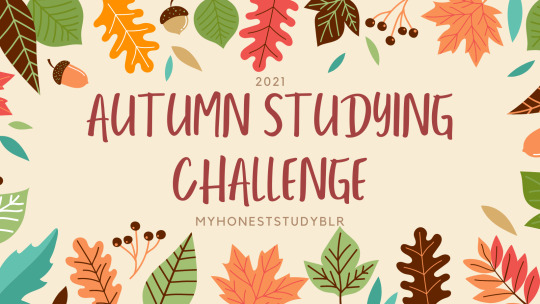
here is my brand new challenge! i’m so excited for this one because i’ve never done an autumn challenge before but it is one of my favourite seasons! i hope lots of you will take part and i can’t wait to get to know you guys! <3
🍂 Info 🍂
If you do the challenge, use the tag #autumn studying challenge so i (and others) can see your posts. I will try to reblog as many posts in the tag as possible.
This challenge will run for 40 days - from the 1st October to the 9th November
There are daily prompts for every day of the challenge
But, as always, I don’t expect everyone to be able to post every day so you can always do catch-up posts!
If you have any questions, feel free to send me an ask!
🍂 Rules 🍂
If you want to do the challenge, please reblog this post
If you do it on any other social media platform (ie. Instagram), please give credit! (my instagram | my tiktok | my pinterest)
The challenge will officially start on the 1st October, but if you come across this later, you can definitely start anytime during these two months!
🍂 Prompts 🍂
1st October - What is your favourite thing about autumn?
2nd October - Do you have any autumn traditions?
3rd October - What is a good memory that you have from autumn?
4th October - Is there anything special happening for you this autumn?
5th October - Do you have any goals for this autumn?
6th October - What is the weather like where you live during autumn?
7th October - What’s the first thing you think of when you hear the word ‘autumn’?
8th October - If autumn were a colour, what would it be?
9th October - What are three things that you associate with autumn?
10th October - What is your favourite autumn food?
11th October - What is your favourite autumn drink?
12th October - What is your favourite autumn scent?
13th October - What is your favourite autumn movie?
14th October - What are your favourite songs to listen to in autumn?
15th October - If you could magically get rid of anything about autumn, what would it be?
16th October - What is would your perfect autumn day be like?
17th October - Outside or inside?
18th October - Sunny autumn days or rainy autumn days?
19th October - Pumpkin spice lattes or hot chocolate?
20th October - What is your usual autumn outfit?
21st October - Falling rain or a crackling fireplace?
22nd October - Pumpkin pie or apple pie?
23rd October - Walk in the woods or read a book in front of the fire?
24th October - Fluffy socks or slippers?
25th October - Fireplace or bonfire?
26th October - Spooky mood or cozy mood?
27th October - Trick or treat?
28th October - Haunted house or Halloween party?
29th October - Buy a Halloween costume or make a Halloween costume?
30th October - If you could dress up as anything for Halloween, what would it be?
31st October - Are you doing anything for Halloween?
1st November - Fairy lights or candles?
2nd November - Vanilla or cinnamon?
3rd November - Splash in mud puddles or walk on crunchy leaves?
4th November - Bake cookies or make bread?
5th November - Sweater or cardigan?
6th November - Scarves or hats?
7th November - What do you prefer: winter or autumn?
8th November - How are you preparing for winter?
9th November - What was your favourite thing about autumn this year?
🍂 So this is the challenge! I hope that you will join in and enjoy doing it this autumn! Please message me or send me an ask if you have any questions about it or just want to have a chat <3 🍂
[Taglist under the cut:]
Keep reading
1K notes
·
View notes
Photo
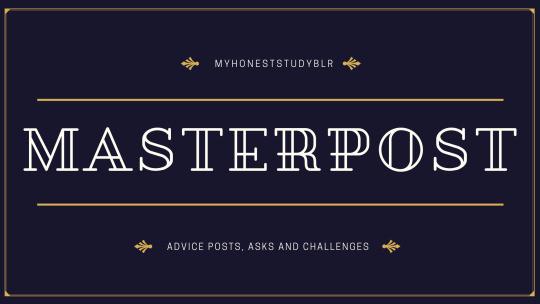
This is a post where you can find all of my advice and asks very easily, all in one place, so you don’t need to search through the tags. My ask box is always open if you ever want advice or support. I will try my best to answer as fully as possible and help you out. I will update this post with the posts as I do them.

How To Start A Studyblr
this is one of my most commonly asked questions so here is a really long post where i give you all of my tips on how to start a studyblr and also get involved in the community
How I Edit My Studyblr Pictures
i go through exactly how i edit my studyblr pictures using snapseed to make it bright and white but still have the colours pop!
How To Stop Procrastinating
in this post, i give you some of my tips for how to stop procrastinating and get productive. i include both some conventional tips but also some unconventional ones that you can try out.
How To Study When You Really Don’t Want To
sometimes studying can be really difficult, particularly if you have no motivation to do so. therefore in this post i give a selection of different tips to try and help you get to work even when that is the last thing you want to do
How to Focus in Online Classes
i know a lot of people still have online classes so i wanted to give some tips that i’ve learnt from experience on how to focus and make sure that you are getting the most from online classes.
Active Revision Techniques
in this post, i explain: active revision and the questions you need to ask yourself to deepen your understanding. i also outline some of the best techniques to make sure you are revising actively!
How To Do Uni Readings
in this post, i give advice on how to tackle lots of academic reading for university. i cover reading goals, selection, active reading and different reading techniques! also see here for the additions from @bulletnotestudies for med specific tips
How To Revise Big Subjects
this post gives you step by step tips on what to do when you are revising for subjects with lots of content to cover, from the very initial steps to the hours before the exam
How To Study Languages
a post for everyone who wants to start learning a language but doesn’t know how to. these tips are some of the most important tips and strategies you need to do to develop your language skills (not related to a specific language)
Top 10 Tips to Boost Motivation
in this post, i share 10 tips that can help you increase your motivation for studying, both some practical things and tips more to do with mindset
Unusual Study Tips
there are a million and one study tips posts so in this one i try to give some ones you might not have heard before in order to give you some new ideas to boost your studying!
How I Use Google Docs To Take Notes
i got asked how i use google docs as part of my notetaking system and so in this post i explain what i like and dislike, about google docs templates and my overall notetaking system: cascading bullet points
How To Annotate
i give you all of my best tips for annotating - both in general and more specifically for literature (novels, plays and poetry) - from my own experiences and some research
Google Search Codes
in this post, i list some of the most useful google search codes because i know that google is often the first step for people when researching.
How To Sleep
so many students struggle with sleep which is so bad because it is so important to help boost studying. therefore, in this post, i outline all the best - and proven - tips to help you sleep better
The Complete Guide to the British Education System
this post is a detailed, in depth explanation of the the British school system, from primary school to university. i explain the differences between private and state schools and between the different UK nations.
My Experiences With GCSEs
in this post i talk about what i did to revise for the first external exams i’ve done. even though the title sounds very specific, it mostly gives all my advice on revision techniques and preparing for exams.
The Best Apps for Students
as the name suggest, in this post i give some of my favourite apps for students and the ones that i use all the time
List of Essay Questions for Foreign Languages (for Beginners)
this was answer to an ask but i think it deserves to be in this section. basically i give a bunch of questions separated into different categories that could be used to build an essay or just as writing practice for beginners in a foreign language. they are all given in english but they can be easily translated.
My Favourite Pens (2019)
i am a huge stationery lover so in this post (which was my very first big post) i give some of my absolute favourites

My Study Routine during Exam Season
Tips for Staying Focused (with ADHD)
Motivation/Discipline tips
Talking about My Motivation
Tips for When You Are Feeling Overworked or Anxious and How Keep Up with Your Work
Tips for When You are Having a Rough Day
Tips for Taking Studyblr Pictures
My A Levels and How Hard They Are
Tips for Starting a Studyblr and How to Get Involved in the Community: [Ask 1] [Ask 2]
How to Make Friends on Studyblr [Ask 1] [Ask 2]
Tips for Doing Languages at A Level
Books, Films and TV Shows to Practice German
Motivation for Posting

2020 Quarantine Challenge : March - July 2020
Summer Studying Challenge: July - September 2020
The Studyblr Community Challenge: Can be done at any time
Winter Studying Challenge: December - January 2020/21

The Ultimate Studyblr Taglist
this post is a collection of tracked tags from blogs in the studyblr community! if you want to be added, please send me an ask telling me your blog name and your tag
3K notes
·
View notes
Text
FYI : this website definitely DOES NOT have a million free TEXTBOOKS and in general books for you all to download 😌
No reason to reblog this 👀
21K notes
·
View notes
Photo


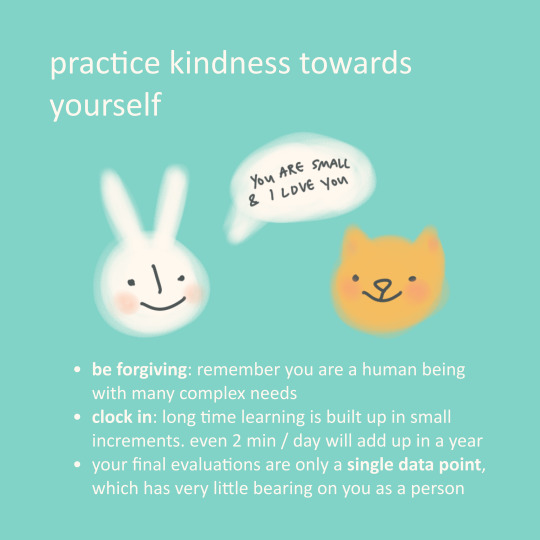
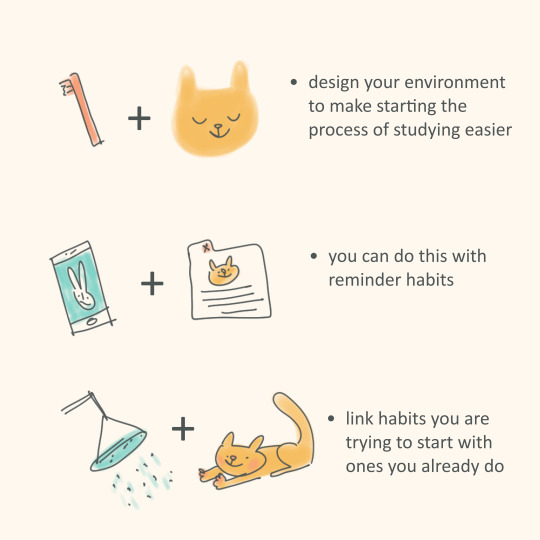
a couple of tips i found helpful and applicable for work / school. collected from my family doctor and meditation apps. studying and productivity culture can be incredibly toxic - but sometimes we really just have to do it. hopefully this helps make the process easier & less painful :)
Keep reading
545 notes
·
View notes
Text

Hello, lovelies! I’ve gotten a couple of asks about studying so I decided to condense them into one post for you guys! I’m trying to hit a bunch of different topics so if you need an even more specific post you can send an ask! Without any further ado, have some tips! My studyblr is @spacey-scholar
Prep
First, you always need a good base for your day! Especially if you’re studying a lot.
Make a good full breakfast! Ex. Eggs and Toast, Smoothie and fruit, Pancakes and a cup of juice.
How’s your hygiene? Do you need to shower, brush your teeth, wash your face, condition your hair? Do it! You’ll be distracted if you feel messy!
Get dressed like it’s a normal day. Staying in PJ’s is okay! But being ready for the day seriously helps focus!
Likewise, your space should be clean. A clean space is a clean mind! Remove dishes, trash, scrap paper, and extra items. Wide down your desk, organize your pens and books. Your space should feel like your space!
Now make a list of what you need to get done! What needs to be done Now, what needs to be done Soon, and what needs to be done Later?
Order your list how you want your day to go, and don’t put super-tough subjects back to back, or subjects that are similar exercises i.e. reading thirty pages of two different books back to back is no fun.
The Studying
It’s important to buckle down with No Distractions! If you find yourself distracted put your phone away! If you need your phone, put it on Do Not Disturb until you’re done. I also do this at night for better sleep.
Pick the best technique for you, Pomodoro, reward-based, group studying, etc.
Play music but only if it will not distract you! If you sing along or daydream it’s the wrong music! Classical, Lo-fi, and White noise are all good! My Spotify Here has some good ones.
Use a nice journal (I don’t mean expensive!) and pens/pencils you enjoy using. I like to have a specific journal and color dedicated to each subject.
Take notes on recorded lectures and classes, if you’re doing online classes right now try to screen record or record the audio! That way if you space out you can play it later and take notes, and you can absorb the lesson better instead of being distracted.
Don’t worry about your notes, stationary, pictures, being beautiful and your grades being perfect. Life doesn’t always look the way it does on Instagram. And the people who spend hours trying to get a good photo of their coffee are not studying!
Use flashcards! Quizlet is good if you need premade ones! If you can save up and buy them, Barrons AP Flash Cards are the best in my opinion. Very clean, not too long, very durable, and cover all subjects.
Feeling Distracted
If you catch yourself drifting off and getting into your head, get up and take a quick walk, stretch, or energizer.
It’s okay if this happens, don’t guilt yourself! practice affirmation. The best and smartest still get distracted.
If you are drifting, why? Are you hungry? Tired? Thirsty? Bored? Get a snack and some water, take a break and rest, find a way to make your studying more enjoyable.
Remember that Motivation and Discipline are different things. Sometimes we just won’t be motivated, we won’t want to do it and it will be rather frustrating. But the cure to this is not shaming its discipline. Remind yourself “This may be hard, and I may not want to do this, but I want to reach my goals and If this is what It takes I will make it happen.
Always do just one more page of you’re tired. One at a time and oh you did it! Maybe just one more? One more? Eh, one more just to finish the train of thought, Oh just- I’m done? Nice!
If you really can’t focus just move on and come back to this subject, you can always ask for help.
Supplementary Things
There are so many apps you can use to study, for free! My favorites are Tide, Quizlet, Focus Keeper, Forest, Flora, Egenda, SpanishDict, Photomath, and Kahn Academy.
You can also join a study group! You may know one, but if you don’t, there are a lot of online ones! I’m in a study Discord and have been for a while! it helps a lot and motivates me to finish my work!
You can make a studyblr, but don’t do it just for the aesthetics! It’s about studying, and sometimes that gets messy! Sometimes we fail a test, we spill our tea on our notes, we cry because we don’t understand the formula. That’s the part you don’t see!
Having cute stationery can really help, as well as nice organizers and decorations for your space! I don’t have much money so I get a lot of stuff on Amazon or FB Marketplace.
Health
Remember that no matter what you are good enough. It’s okay if you fail, it’s okay if you struggle.
It’s also okay if your path doesn’t go the way you expected! Maybe you go to a different school than expected! Or choose a trade instead! Maybe you take a gap year! Maybe your passion changes! Maybe it changes six times!
Your health is always more important than your school. If you are in pain, mentally or physically, if you are anxious, exhausted, burnt out, talk to your teachers about it! You matter more than a grade.
Your best is good enough! And your best doesn’t look the same as someone else’s best! Don’t compare!
Now go get out there and study!
17K notes
·
View notes
Note
Hai I’m starting college ina few days and I need textbooks pero I don’t know if any good websites to find cheap/free ones? Pls help
Hey, check this link for a list of websites that have free textbook pdfs.
Also, thriftbooks is a great website for getting used textbooks for cheap. You can also search your textbook’s ISBN on Amazon and check to see if they have it for rent for a low price as well. Beware that if you need a newer edition, an edition written for a college specifically, or an online access code such as Cengage or MyLab, you may need to purchase the book new.
Or, some people have suggested, if at all possible, do as much of the online portion of the class as you can during the two week trial that Cengage and MyLab often offer.
All the love xx
1K notes
·
View notes
Text
Free Health Science Resources
Anatomy and Physiology
Anatomy and Physiology Textbook
Anatomy and Physiology I Lecture Notes
Anatomy and Physiology I Lecture Notes and Powerpoint Slides
Anatomy and Physiology II Lecture Notes and Powerpoint Slides
Anatomy and Physiology II Lecture Notes
Anatomy and Physiology I and II Lecture Notes
Human Anatomy and Physiology II Lecture Notes
Human Anatomy and Physiology II Summary
Anatomy and Physiology (Alpena High School)
Anatomy and Physiology (Mrs. Chou)
Human Anatomy and Physiology – Heart Notes
Human Anatomy and Physiology – Blood Notes
Human Anatomy and Physiology – Respiratory System
Human Anatomy and Physiology – Endocrine System
Medical Terminology
Medical Terminology on Memrise
Medical Terminology (based on textbook) on Memrise
Medical Terminology A - Z on Memrise
Online Medical Dictionary (with Search Feature)
Medical Terminology (Des Moines University)
Webster’s Medical Dictionary
Medical Terminology
Medical Abbreviations
Medicine in Other Languages
Spanish
Medical Spanish Themed List
Anatomy in Spanish
Medical Spanish on Memrise
Spanish Medical Terminology Flashcards
English-Spanish Medical Dictionary
French
French Medical Terms
Medical French Themed Lists
French Medical Terminology
English-French Medical Dictionary
Glossary of French Medical Terms
English-French Glossary for Medicine
Japanese
Japanese Medical Terms on Memrise
Face and Body Parts in Japanese
Symptoms in Japanese
Pharmacy Terms in Japanese
Romanian
Romanian Medical Vocabulary
English-Romanian Medical Glossary
German
Medical Terms in German
German Medical Dictionary
Basic German Medical Terminology
Glossary of German Medical Terms
Chinese
Traditional Chinese Medical Terminology
Chinese Medical Terminology (Simplified)
Chinese Medical Terminology (Traditional)
Chinese Medical Vocabulary
Medical Chinese
Hindi
Common Medical Terms
Types of Doctors
Russian
Terms to Know
Russian Medical Terms
English-Russian Medical Phrasebook
Russian Words – Medicine
Emergency Medicine
Mosby’s EMT Lecture Notes
Emergency Medical Responder on Memrise
EMT Test Prep Study Guides
First Aid Textbook
Wound Care
Pathology
Diseases and Conditions A - Z
Symptoms A - Z
Tests and Procedures A - Z
Medical Syndromes on Memrise
Muscle Pathophysiology
Kaplan Pathology Textbook
Pathology Lecture Notes
Intro to Human Pathology Lecture Notes
Microbiology
Microbiology Notes
Microbiology Powerpoint
Microbiology Lecture Notes
Introduction to Food Microbiology (requires free sign-in)
Microbiology Lecture Notes by HCC
General Microbiology Notes (requires download)
General Microbiology Powerpoint (requires download)
Medical Microbiology for Dentistry Textbook (requires download)
General Microbiology Lecture Notes
Parasitology
Introduction to Parasitology Powerpoint
Medical Parasitology Lecture Notes
Parasitology Notes by Week
Basics of Medical Parasitology
Medical Parasitology (requires free sign-in)
Veterinary Parasitology
Parasitology Lecture Outlines
Medical Parasitology
Virology
Introduction to Virology Powerpoint
Virology Table
Virology Textbook
Virus Explorer
Virology Powerpoints
Virology Powerpoint (Abdul-Azeez Anjorin)
Virology (MBChB Resource Materials)
General Properties of Viruses Powerpoint
Miscellaneous Viruses Powerpoint
Pharmacology
Drugs and Supplements A - Z
Principles of Pharmacology Lecture Notes
Pharmacology Infographics
Pharmacology Notes
Pharmacology Powerpoint
Pharmacology Notes (Adam Hollingworth)
Neurotoxins
Bacteriology
Bacteriology Textbook
Bacteria Metadatabase
Mycobacteria Powerpoint (requires log-in)
Pathogenesis of Bacterial Infection (requires log-in)
Bacterial Infections (requires log-in)
Bacteriology Lecture Notes
Normal Flora of Humans
Bacteriology Resources
Medical Bacteriology
Biology
Biology Textbook
Biology 2 Textbook
Concepts of Biology Textbook
AP Biology Notes
Biology Glossary
Biology Documents
Biology Notes (Class 11)
Biology Notes (Class 12)
Biology Notes by Topic
Campbell’s Biology Powerpoints
Campbell’s Biology Outlines
Forensics
Forensic Psychology
Forensic Science Powerpoints
Forensics Notes, (with Lesson Plans, Worksheets, etc.)
Forensic Science Notes
Forensics Notes Document
Forensic Science Lecture Notes
Forensics Notes (Alpena High School)
Forensic Science Documents
Forensics Glossary
Nutrition
Vitamins and Minerals
Proteins in Nutrition
Proteins
Sports Nutrition
Nutrition and Digestion
Nutrition and Digestion Biology Notes
Principles of Human Nutrition Lecture Notes
Basic Nutrition Lecture Notes
Nutrition Notes
Nutrition – United Nations
Sports Medicine
Sports Medicine Powerpoints
Athletic Training Program Powerpoints
Specific Sports Injuries Lecture Notes
Sports Medicine Powerpoints (Miami Dade)
Sports Medicine Handouts
Sports Medicine Presentations (USUHS)
Sports Medicine Lecture Notes (WUHS)
Sports Medicine Handbook
Performance Enhancement Lecture Notes
Athletic Training and Sports Medicine Lecture Notes
Exercise Physiology Lecture Notes
Exercise Physiology Lecture Notes (Windsor)
Basic Exercise Physiology Powerpoint
Clinical Exercise Physiology Notes
Exercise Physiology Powerpoint (Columbia)
Active and Healthy Lifestyles
Sport Coaching and Psychology
Psychology of Sports Injury
Chemistry of Sports
Exercise and Mental Health
Ecology and Evolution
Ecology and Ecosystems
Ecology
Ecology (Carter Center)
Ecology Powerpoints
Ecology Documents
Ecology Glossary
Environmental Science Chapter Vocabulary
Environmental Science Glossary
Environmental Science Formulas
Environmental Science Notes by Topic
Botany (requires log-in)
Plant Structure Powerpoint (requires log-in)
Introduction to Ecosystems
Atmosphere, Oceans, and Environmental Change
Global Warming
Science of Evolution
The Evolving Universe
Co-Evolution
Evolution, Ecology, and Behavior
Evolution Through Natural Selection
Artificial Selection and Domestication
Environmental Politics and Law
Epidemiology
Infection and Immunity
Introduction to Epidemiology Powerpoint
CDC’s Intro to Epidemiology Powerpoint
Epidemics in Western Society
Epidemiology: An Introduction
Influenza: Case Study
Vaccination
Overview of Epidemiology Notes
Basic Epidemiology Textbook
Principles of Epidemiology in Public Health Textbook
Public Health Approaches to Infectious Disease
Health Trends in America - Statistics
Chemistry
Organic Chemistry I
Organic Chemistry II
Chemistry Textbook
Chemistry of Health Textbook
Chemistry Notes
AP Chemistry Notes
Chemistry Notes and Powerpoints
Chemistry Class Notes
Chemistry Notes (Class 11)
Physical, Organic, and Inorganic Chemistry Notes
Physical Chemistry Lecture Notes
Chemistry Notes (Class 12)
Modern Chemistry Chapter Notes
Chemistry Notes by Topic
Chemistry Glossary
Chemistry, Organic Chemistry, and Stoichiometry Notes
Medical Biochemistry
Psychology
Intro to Psychology
Introduction to Psychology Notes
AP Psychology Chapter Outlines
Starting Psychology
Psychology Lecture Notes
AP Psychology Notes
AP Psychology Glossary
Major Psychologists in History
Psychology by David Myers Chapter Outlines
Psychology: Themes and Variations Chapter Outlines
Psychology Notes / Textbook
Psychological Research, Obedience and Ethics
Introduction to Social Work
Introduction to Child Psychology
Eary Development
Emotions and Emotional Disorders
Depression and Anxiety
Anthropology
Introduction to Anthropology Notes
Introduction to Anthropology Notes (short)
Anthropology Notes
Anthropology Notes (Harsha Koya)
Anthropology Lecture Notes
Anthropology Lecture Notes (MIT)
Anthropology Notes (Handwritten)
Sociocultural Anthropology
Biological Anthropology
Introduction to Cultural Anthropology
Anthropology Lecture Notes (HCCS)
Anthropology Flashcards
Paleontology
Paleontology Lecture Notes
Paleontology Resources
Principals of Paleontology Lecture Notes
Paleontology: Fossils Lecture Notes
Paleontology (Textbook-like)
Paleobiology (Textbook-like)
YouTube Channels & Videos
Crash Course
Crash Course: Biology
Crash Course: Chemistry
Crash Course: Ecology
Crash Course: Anatomy and Physiology
Crash Course: Psychology
Crash Course: Sociology
Evolution
Evolution and Origin of Life (Richard Dawkins)
Origin of Life on Earth
History of Earth
Evolution Lectures (Yale)
Evolutionary Biology Lectures
Evolution, Ecology, and Behavior Series
Evolution Lecture Series
Human Evolution
Hominid Evolution
Hominid Paleobiology
Mass Extinction and Evolution
Biology
Introduction to Biology
Introduction to Biology (Fink)
Introduction to Biology Lecture Series
Fundamentals of Biology Lecture Series
Paleontology
Origin, Evolution, and Extinction of Dinosaurs
Extinction of the Dinosaurs
First Apocalypse: Extinction of Dinosaurs
The Evolution of Flight
Evolution of Birds
Predatory Dinosaurs
Bizarre Dinosaurs
Valley of the T. Rex
Dire Wolf
Biggest Killer Dinosaur
Extreme Survivors: Dinosaurs
When Whales Had Legs
Before They Were Bears
Finding Dinosaur Fossils
Anatomy and Physiology
Introduction to Anatomy and Physiology
Basic Chemistry and Biochemistry
Cells
Anatomy and Physiology of Tissues
Tissues
Muscles and Muscle Tissue
The Nervous System
Nervous System and Nervous Tissue
Neurons
The Respiratory System
The Digestive System
Metabolism and Nuitrition
The Endocrine System
The Cardiovascular System
Blood
Anatomy and Physiology of the Heart
The Reproductive System
The Integumentary System
Bones and Skeletal Tissue
Anatomy and Physiology of the Human Body
Anatomy and Physiology Lecture Series
Anatomy and Physiology of…. Lecture Series
Anatomy and Physiology Lecture Series (Ford)
Anatomy and Physiology II Lecture Series
Human Anatomy and Physiology Series
All Subjects
Rahul Gladwin
MedNotes
Medical Powerpoint Collections
Medical and Health Encyclopedia
10K notes
·
View notes
Photo

Press Ctrl+F or ⌘F to do a quick search!
bookboon // for accounting, business, economics & finance, engineering, IT & programming, languages, marketing & law, natural sciences, statistics & mathematics (+ career & study advice, strategy & management)
booksee // for arts & photography, biographies & memoirs, business & investing, computers & internet, cooking, entertainment, health, history, home, law, literature & fiction, medicine, references, religion, science, sports, travel, and other categories
bookstacks // for popular classics
boundless // for accounting, algebra, art history, biology, business, calculus, chemistry, communications, computer science, economics, education, finance, management, marketing, microbiology, music, physics, physiology, political science, psychology, sociology, statistics, U.S. history, world history, writing
california learning resource network // for mathematics, science, history
ck-12 // for elementary math, arithmetic, measurement, algebra, geometry, probability, statistics, trigonometry, analysis, calculus, earth science, life science, physical science, biology, chemistry, physics, sat exam prep, engineering, technology, astronomy, english, history
college open textbook // for anthropology & archeology, art, biology & genetics, business, chemistry, computer science, economics, engineering & electronics, english & composition, health & nursing, history, languages & communication, law, literature, math, music, philosophy, physics, political science, psychology, science, sociology, statistics & probability
Keep reading
81K notes
·
View notes
Text
educational youtube channels:
for when the burnout is real and all you really wanna do is lie in bed and watch things but you gotta at least try to study. these are mostly channels i’ve watched and subscribed to! (updated 17/12/2015)
sciences
veritasium
it’s okay to be smart
pbs space time
crash course: astronomy
crash course: ecology
crash course: biology
crash course: chemistry
crash course: anatomy and physiology
crash course: psychology
the school of life: sociology
the school of life: psychotherapy
scishow
scishow space
asapscience
minute physics
minute earth
khan academy
the brain scoop
sexplanations
healthcare triage
sixty symbols
periodic videos
deep sky videos
literature / art
crash course: literature
the school of life: literature
the school of life: art/architecture
art assignment
thug notes: shakespeare explained
thug notes: classic literature
history / geography / government
crash course: world history (season one)
crash course: world history (season two)
crash course: us history
it’s history: the industrial revolution
it’s history: the history of pirates
it’s history: battlefields (military history)
it’s history: the cold war
the school of life: history
alternate history hub
crash course: intellectual property
crash course: economics
crash course: u.s. government and politics
geography now
the school of life: political theory
it’s history: the history of china
it’s history: weapons of mass destruction
it’s history: the history of sex
extra credits: extra history
khan academy: history
khan academy: american civics
the great war
tom richey: ap euro review
tom richey: ap us history review
cgp grey
math
numberphile
khan academy
vihart
philosophy
the school of life: philosophy
the school of life: eastern philosophy
philosophy tube
8-bit philosophy
misc / no particular subject
crash course: big history
ted-ed
smarter every day
in a nutshell
vsauce
dnews
test tube news
test tube plus
seeker daily
the good stuff
thoughty2
how to adult
mental floss
54K notes
·
View notes
Text
Basic Concepts in Logic and Argumentation (Playlist)
What is an Argument?
What is a Claim, Statement, or Proposition?
Identifying Premises and Conclusions
What is a Good Argument?: (Part I) (Part II)
What is a Good Argument?: The Truth Condition
What is a Good Argument?: The Logic Condition
What is a Valid Argument?
What is a “STRONG” argument?
What is a Deductive Argument?
What is an Inductive Argument?
Induction and Scientific Reasoning
Reasoning with Probabilities (Playlist)
Probability: Why Learn This Stuff?
Interpretations of the Probability Concept: Why We Need Them
What is Inductive Logic?
Probability: The Classical Interpretation
Probability: The Logical Interpretation
Frequency Interpretations of Probability
What is Subjective (Bayesian) Probability?
The Propensity Interpretation of Probability
Probability: Proposition Language vs Event Language
A Probability is a Number Between 0 and 1
What MUTUALLY EXCLUSIVE means in Probability Theory
What INDEPENDENCE Means in Probability Theory
Probability: The Negation Rule
Probability: The Restricted Disjunction Rule
Probability: The General Disjunction Rule
Probability: The Restricted Conjunction Rule
Probability: The General Conjunction Rule
Conditional Probability: Basic Definition
An Introduction to Bayes’ Rule
Common Valid and Invalid Argument Forms (Playlist)
Valid Argument Forms Using OR
Invalid Argument Forms Using OR
Modus Ponens
Modus Tollens
Hypothetical Syllogism
Formal Fallacy: Affirming the Consequent
Formal Fallacy: Denying the Antecedent
Argument Forms using “ALL”
Argument Forms using “SOME”
How to Write a Good Argumentative Essay (Playlist)
How to Write a Good Argumentative Essay: Introduction
How to Write a Good Argumentative Essay: Logical Structure
How to Write an Introduction
How to Write a Conclusion
An Argumentative Essay That Needs Work
Analyzing a Sample Argumentative Essay: The Introduction / First Argument / Second Argument / Third Argument / The Main Body / The Conclusion
An Improved Argumentative Essay with Commentary
129 notes
·
View notes
Photo
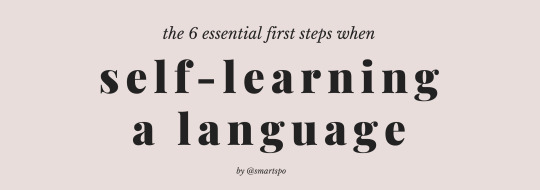
As a language lover who can’t possibly afford all of the language lessons I would love to take, over the years I learned the best ways to self-learn them. This introductory phase doesn’t even require a textbook - I am sure everything here can be found online for free.
Disclaimer: this is the method that works the best for me, and I’m sharing it with the intention of helping other people who are stuck. There’s a million different ways to self-learn a language, so if this one doesn’t work out for you, don’t lose motivation!
Disclaimer 2: this method might not work with all languages. I’m sharing this knowledge keeping in mind my experience with Latin (in particular French, Spanish, etc) and East Asian (in particular Korean and Japanese) languages.
Without further ado, here are the steps:
1. If you’re learning a language that uses a different alphabet, make sure that’s the first thing you learn
Relying on romanization is fine at first, but further down the path it will only serve to confuse you. Romanized words of these types of languages can be written in many different ways, so often they don’t even provide an accurate way of pronouncing them. Furthermore, as you make progress, you won’t be able to access a lot of content in your target language since you won’t find it romanized.
2. Learn your first words
Before actually getting into all the grammar rules and whatnot, learn your first words! These include, among others:
Greetings
Answers (yes, no, maybe, etc)
Numbers
Please and thank you
Practice their pronunciation to get used to the language’s sounds, and how they’re written (especially if you have to use another alphabet - it’s a chance to practice your calligraphy!).
3. Learn essential vocabulary and grammar
I call these “essential vocabulary/grammar” because they are words you must know to build sentences (other than verbs). These include:
Articles (definite, indefinite, partitive, etc)
Basic pronouns (personal, possessive, etc)
Depending on the language, basic grammatical particles
Sentence order! In many languages, the subject/verb/noun order is totally different. Make sure to know how your target language orders that.
Make sure to also learn their rules and remember the exceptions. The latter are always annoying, but don’t worry - as you progress, you will learn these by heart, and they will eventually come to you naturally!
4. Learn the most basic verbs in the present tense
Like the vocabulary of the previous step, verbs are also essential when building sentences. Now that you’re only a beginner, you don’t need to learn difficult verbs or tenses, so stick with the most used ones:
to be
to have
to do/make
to say
to go
to know
to think
to see
to want
to give
5. More vocab!
Now that you know your verbs, complement your knowledge by adding more basic vocabulary. Here are some ideas:
Places
Food
Objects
Adjectives
Family members
Knowing these in addition to the grammar points you’ve learned will allow you to construct simple sentences, such as I am going home or This is my sister.
6. Practice for your level
Like many other people, I’m guilty of jumping straight into watching movies and shows in my target language, only to get frustrated with myself when I don’t understand anything despite everything I learned until then. Of course, I’m not saying you shouldn’t do it, since it does help you develop your listening skills (especially if you do it with subtitles!), but I have a tip for the ones who prefer an easier activity.
Look for children’s content! I know this sounds silly at first, but books, movies, shows, etc made for children usually use basic grammar and vocabulary. If you think about it, the listening exercises you find in language grammar books made for beginners often seem like they’re made for children for that reason. Therefore, if you can’t find clips and texts for your level easily, try following this tip!
A few more tips for self-learners + resources
Write a diary in your target language. Even if you don’t know that much, try describing your day the best way you can (even if that means you have to write everything in the present tense). That’s a way of understanding what sort of vocabulary is useful in your daily life and what are your weaknesses.
For you listening skills, other than Netflix, listen to music as well! Seize the opportunity to also learn the new vocabulary you find in the songs.
For speaking skills, if you don’t have anyone to practice with, read texts out loud and record yourself to check your pronunciation. If you’re up to it, finding friends online that speak your target language is also a great way of practicing dialogue!
Most used words in every language
Textbook masterpost
More helpful books!
Random tasks to practice your target language
My blog’s langblr tag for more helpful posts
Happy studying! ✨
2K notes
·
View notes
Text
Academic Writing Resources
General:
The Five-Paragraph Essay
Using Punctuation Marks
Deadly Sins Checklist
Formatting Your Paper
Writing About Literature
Basic Essay
Revision Checklist
Planning and Organization
Editing and Proofreading
Latin Terms
Essay Structure
Tips on Introducing Quotes
Academic Writing Tips
Introductions:
Introductory Paragraphs
Introductions
Writing an Introduction
Preparing to Write an Introduction
Introduction Strategies
The Introductory Paragraph
Writing Effective Introductions
In The Beginning
Introductions and Conclusions
The Introductory Paragraph
Writing Introductory Paragraphs
How to Write an Intro
Body Paragraphs:
Paragraph Development and Topic Sentences
Transitions
Transitions
Transitions
Four Components of an Effective Body Paragraph
Writing Paragraphs
Paragraph Development
Body Paragraphs
Body Paragraphs
Strong Body Paragraphs
Body Paragraphs
Writing Body Paragraphs
How to Write Body Paragraphs
Writing the Body
Writing Body Paragraphs
Body Paragraphs
Body Paragraphs that Defend a Thesis
How to Write Body Paragraphs
The Perfect Paragraph
Topic Sentences:
Topic Sentences
Writing Topic Sentences
Topic Sentences
Topic Sentences
The Topic Sentence
Paragraphs and Topic Sentences
The Topic Sentence
Topics, Main Ideas, and Topic Sentences
Writing a Good Topic Sentence
Good Topic Sentences
Conclusions:
Writing Effective Conclusions
Introductions and Conclusions
Conclusion Paragraphs
Conclusion Strategies
Conclusions
Tips for a Strong Conclusion
The Concluding Paragraph
Ending the Essay
Types of Conclusions
Writing a Strong Conclusion
How to Write a Conclusion
Writing Conclusions
Guide to Conclusions
Thesis Statements:
The Thesis Statement
Thesis Statements
Writing a Thesis Statement
Thesis Statement
Tips and Examples
Writing a Thesis
Writing the Thesis
How to Write Your Thesis
The Thesis
Thesis Statements
Guidelines for Writing a Thesis
Thesis Statements
Thesis
Thesis Statements
The Thesis
Create a Strong Thesis
How to Write a Thesis
Developing a Thesis
Guide to Writing Thesis Statements
Thesis Statements
Citing:
When to Cite
APA Documentation
MLA Documentation
Suggestions for Citing Sources
Research and Citation Resources
Citation Information
MLA Guidelines for Citing Poetry
MLA Style for Poetry
How to Format Your Paper
Argumentative Essays:
Argumentative Essays
Argument
Argumentative Essays
Persuasive or Argumentative Essays
Argumentative Essay
Argument/Argumentative
Argumentative Essays
How to Write a Good Argument
How to Write an Argumentative Essay
Writing Conclusions to Argumentative Essays
Argumentative Essay
Persuasive Essay Writing
Writing Concluding Paragraphs
Constructing the Argumentative Essay
Writing About Poetry:
Writing About Poetry
Writing About Poetry
Writing About Poetry Q & A
Poetry Explications
Writing About Poetry
Writing About Poems
Explicating a Poem
Writing About Poetry
Writing a Thesis Paper About a Poem
How to Start a Poetry Introduction
Poetry Essay Structure
Poetry Explication
Expository Essays:
Structure of a General Expository Essay
Expository Essay Examples
Sample Expository Essay
Expository Writing
Expository Essay Model
Elements of Expository Essays
Expository Writing Information
Expository Essays
Writing Expository Essays
How to Write an Expository Essay
Tips on Writing an Expository Essay
Expository Essays
Essay Map
Writing Expository Essays
How to Create a Strong Expository Essay
Expository Essay Writing
The Expository Essay
Research Papers:
How to Write a Research Paper in Literature
Writing a Research Paper
The Research Paper
How to Write a Research Paper
Five Paragraph Research Paper
Sample Research Paper
Writing a Research Paper
Tips for a Research Paper
How to Write a Research Paper
Writing a Scientific Research Paper
Writing Research Papers
Research and Writing
Research Papers that Rock
How to Write an Effective Research Paper
College Application Essays:
Application Essay Tips
Application Essays
Tips
10 Tips
Application Essays
How to Write a College Application Essay
Tips for an Effective Essay
Do’s and Don’t’s
College Application Essay
How to Write a College Application Essay
Narrative Essays:
Narrative and Descriptive
Narrative Essay Writing
The Personal Essay
Narrative Essays
Narrative Essays
Writing Narrative Essays
Narrative/Descriptive
Narrative Essay
Writing a Narrative Essay
Tips on Writing a Narrative Essay
96K notes
·
View notes
Text
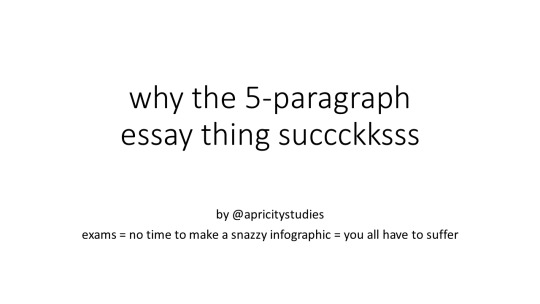
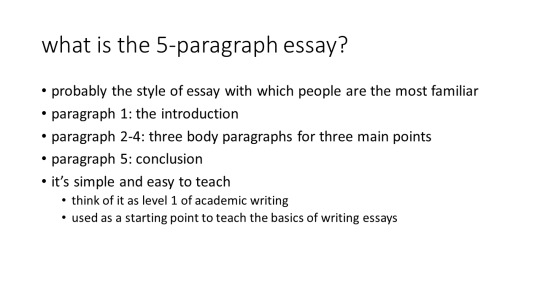
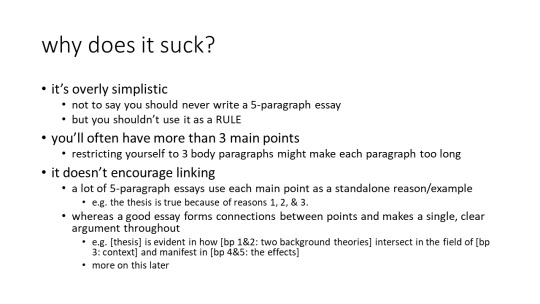
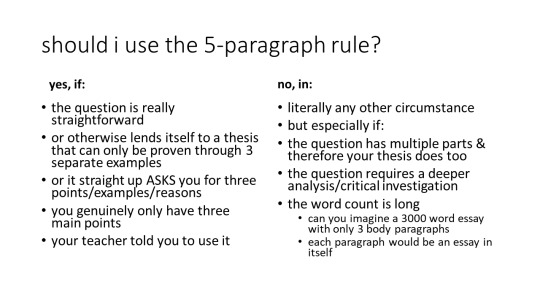
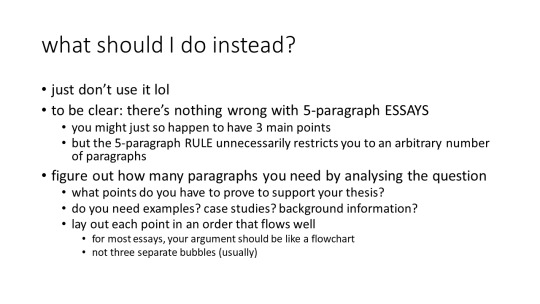
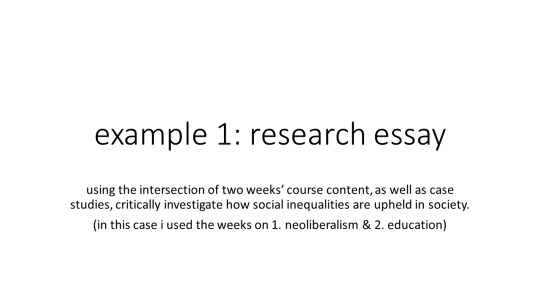

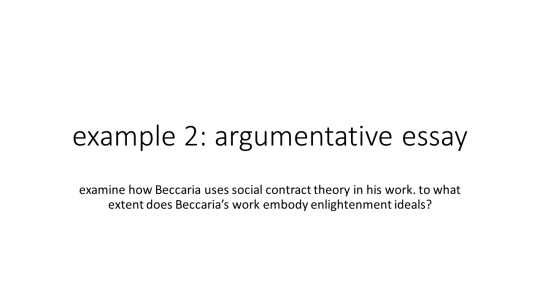
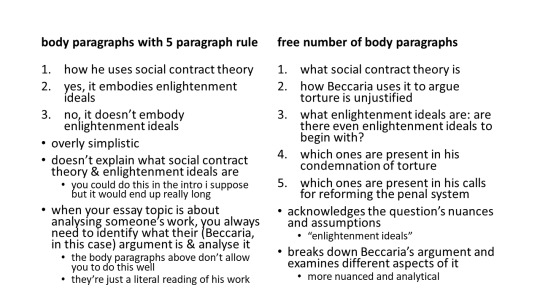
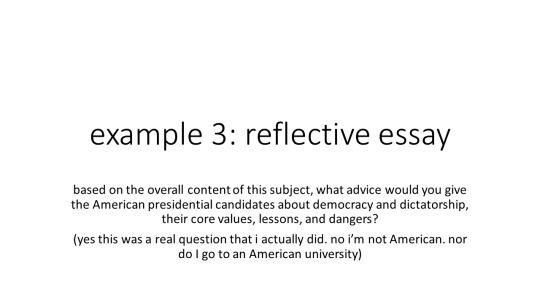
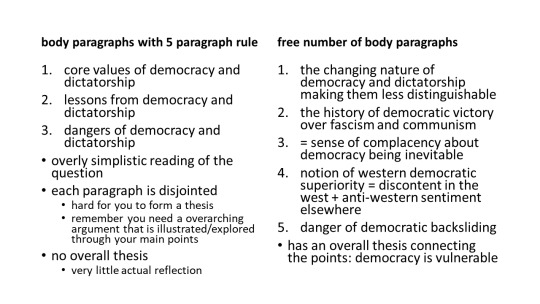

why i hate (well, hate is a strong word) the 5-paragraph rule and what i use instead! these examples are tailored to the humanities and social sciences, so keep in mind this might be different for other fields of study.
i also have an essay preparation guide here :)
2K notes
·
View notes
Text
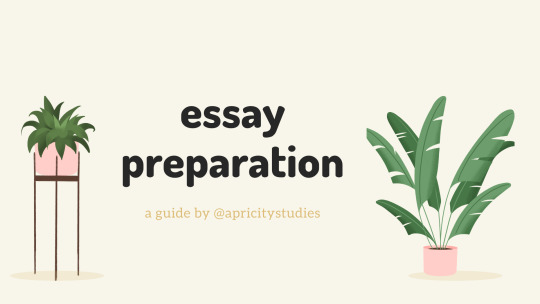
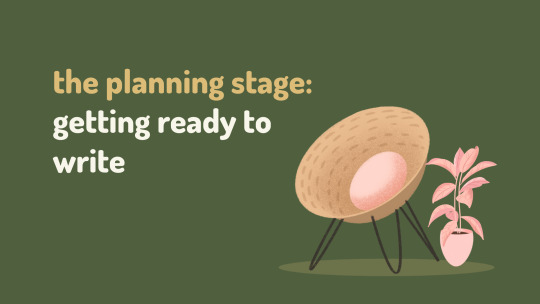
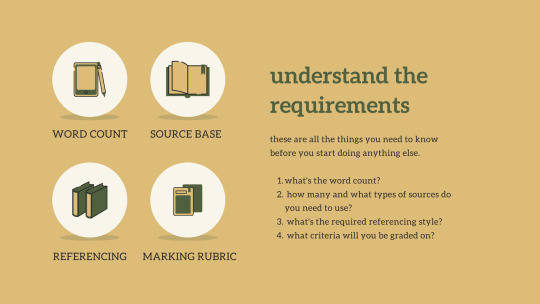
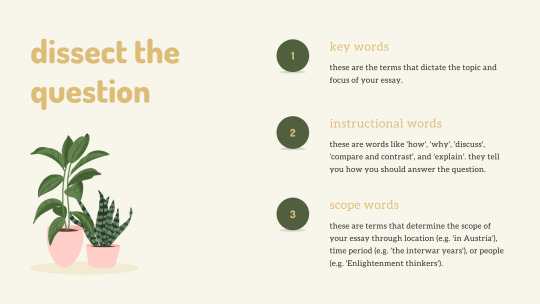
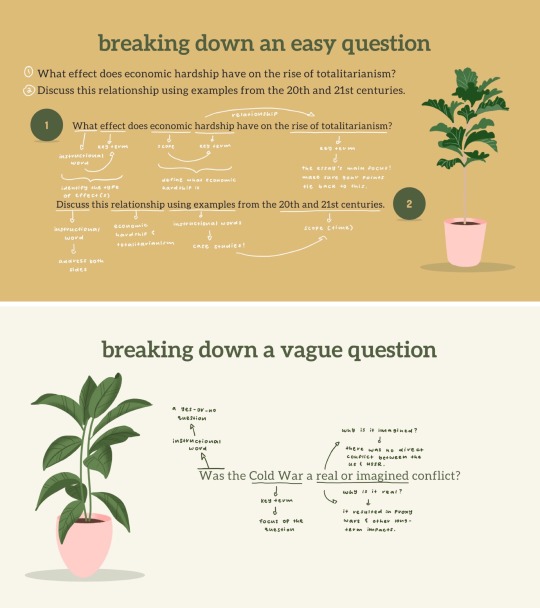

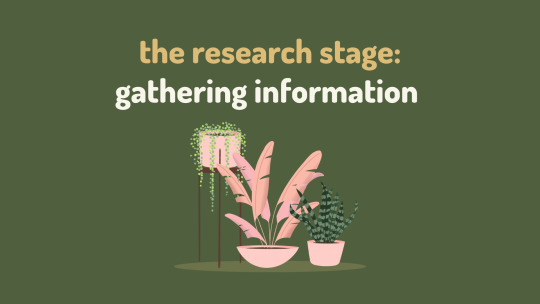
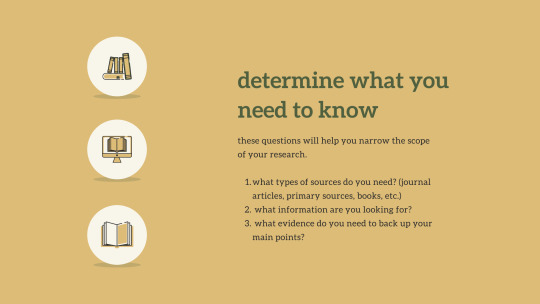
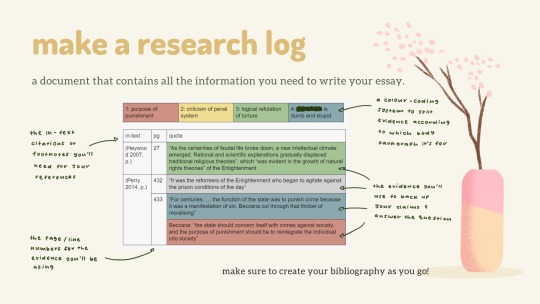

every minute spent on planning saves you ten minutes spent on execution. short essays probably don't require that much preparation beforehand, but if you're writing something longer you should probably spend some time planning first. this is the process i go through when planning my essays, and i find it works really well!
14K notes
·
View notes
Photo


Recently, I had to make a cover letter and wow– did I have trouble making it. I had absolutely no idea how to write a cover letter, and I didn’t know just how easy it would be.
So, I wanted to share this with people who don’t know how to format their cover letter, or even know how to do one. Yes, and if you didn’t know, there are many ways to do so, but this is the way I made mine. Let me know if you need anymore help. Hope this is enough.
Click the image to see the sample image enlarged.
463 notes
·
View notes
Text
university studying tips
i’m returning to university after taking a year hiatus, so here are some study/uni tips that i discovered the first 2 years of uni/wish i had implemented more often
study every day for at least an hour
write down study notes + lecture notes
rewrite these - both by hand and typing - as often as possible
seriously. rewrite your notes. have them down somewhere so that they’re legible, but then handwrite your notes as many times as you can, even if it isn’t legible
repetition helps with not only memorization, but comprehension as well
say notes aloud as often as possible
if you’ve safe access to a library, take yourself out on a date
make it a habit 2x-4x a week at specific times going to your library and finding a spot and just studying for 3-4 hours
i would always go tuesday, wednesday and thursday nights from 2pm-8pm. this is when i would get my homework assignments and reading done for most of the week/get ahead where i could
grab yourself a coffee and a snack and remember to take breaks in between!!! every 45 minutes, take a 5 minute break <3
use gum, perfume, or [**diluted**] essential oils as aids during studying, and remember to repeat when taking exams
if you’re studying for an exam and chewing peppermint gum, by chewing the peppermint gum during the exam, it can help trigger the memories of what you were studying
plan ahead
mark out in a planner or calendar when all of your weekly assignments are due, quizzes, exams, and papers
set time aside each day of the week where you are able to work on upcoming projects
for papers that are due in, say, a month
as soon as you have the topic picked out, spend a few moments each day finding academic sources
when reading the material that will be pertinent, highlight/bookmark as you go along. this will help you in the long run (especially if you are using secondary sources and need a quick quote or citation)
send rough drafts to your professor or your schools writing services for thoughts and additions; it can be super nerve-wracking at first, but i promise it helps a lot
you don’t need to color coordinate, but it can help
keep it simple, too much color can and will distract you. but highlighting vocab words, dates and other important things like that can help a lot if you’re trying to find something specific in your study notes
take breaks often, but don’t procrastinate or get distracted (i’ll write another post soon on how to specifically avoid distraction and burn out)
know that grades do not define you. i promise, they don’t.
speak to your professor or advisor if you are falling behind in a class or multiple classes and need aid or extensions. they are there to help you and to teach you. they are your biggest resource. use it.
if you need someone to talk to, i’m here <3
827 notes
·
View notes